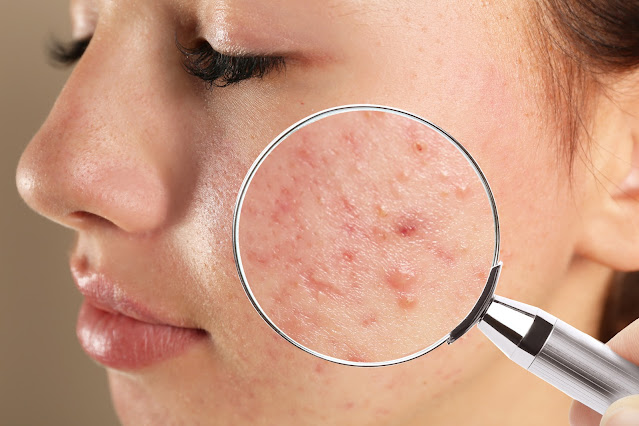Acne: How to treat it?
Acne is one of the most common skin complaints and can affect adolescents, teens, and even adults. Some people experience acne well into their adult years. While spots themselves don’t cause any significant health problems, they can be uncomfortable, painful, or leave behind scars.
Perhaps the most
damaging effect acne can have on a person, however, is on their emotional
health. Breakouts commonly cause depression, anxiety, and issues with self-image
and self esteem. They can also make a person embarrassed of their appearance.
What Causes Acne?
Your skin care produces a
substance called sebum, a type of oil made by the sebaceous glands under your
skin. When sebum builds up in the pores of your skin and becomes trapped, this
can lead to pimples and spots. Spots can also be caused by your pores becoming
clogged with hair, dead skin cells, and bacteria.
Acne is a term that
covers more than just red or pink bumps. There are several different types of
acne and it’s estimated that up to 80% of people will experience one or more
forms of it at some point in their lifetimes.
Acne Types
- Papules:
Small inflamed red or pink bumps.
- Pustules: Pimples with pus inside them that look like
whiteheads surrounded by reddish rings. They can leave scars if picked or
popped.
- Whiteheads: White bumps that are closed by oil and dead
skin.
- Blackheads: Open bumps on the skin plugged with excess
oil and dead skin. The dark colour is caused by light reflecting off the
clogged follicle.
- Nodules: Solid, hard pimples located deep under your
skin. They are larger than other spots and can be painful.
- Cysts:
Large, pus-filled pimples that can leave scars behind after they heal.
Why some people
experience acne more often than others can be down to several factors. Hormonal
changes can increase sebum production, especially during puberty, pregnancy, or
the menopause. Stress and anxiety is also thought to be a cause of spots.
Proper hygiene is important to clear
skin, but be sure to avoid overwashing your face as this can overdry your skin
and damage it.
Acne Treatment
There are several
popular forms of topical acne treatment at home, including over the counter
products like witch hazel, tea tree oil, salicylic acid, and benzoyl peroxide.
For milder or infrequent breakouts, these types of acne treatment may be enough
to clear the skin.
More severe or
persistent cases of acne will need stronger acne medication. There are several
options when it comes to prescription acne medication, including medicated
topical treatments and antibiotics. Some people can also elect to have cosmetic
procedures done by aestheticians like chemical peels or laser and light
therapy.
Acne Treatment Clinic in Wimbledon
Pearl Chemist Group
offers an acne treatment clinic in Wimbledon and at several of our other
locations. No matter what level of acne you’re suffering from, our experts can
help. Contact us or call in to find out more about the best acne treatment in
Epsom and acne spot treatment in Streatham.

Comments
Post a Comment